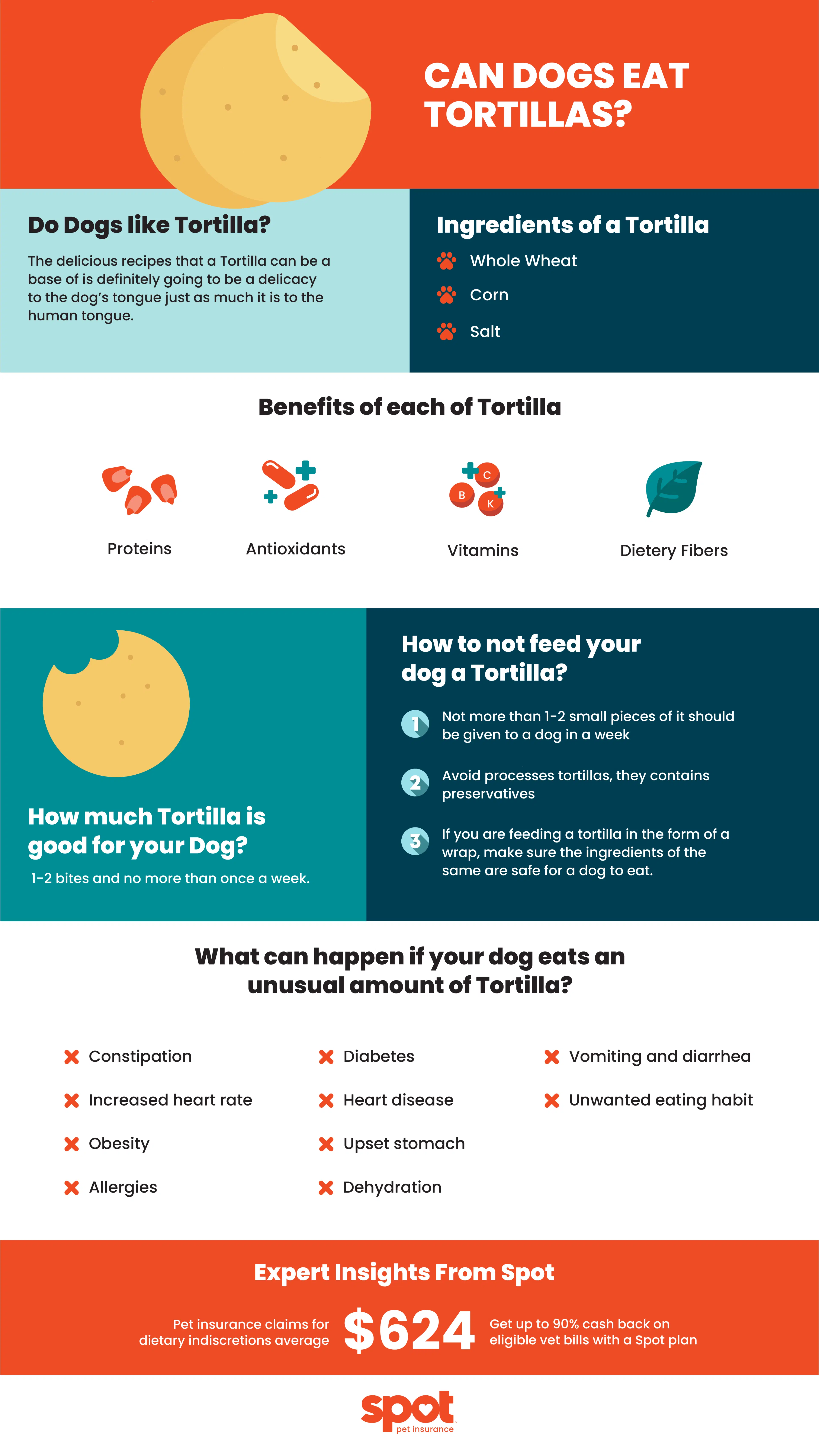Thin, round, flat bread of Mexico usually made from cornmeal and less commonly wheat flour, Tortillas, provide fiber, whole grains and other nutrients to the human body. The quesadillas, Mexican wraps, baked tortilla chips, etc., are some of the delicious gifts out of a tortilla. As delicious they are to the human tongue, are they the same for dogs? And are they good for them, health wise?
Do Dogs Like Tortilla?
The delicious recipes that a Tortilla can be a base of is definitely going to be a delicacy to the dog’s tongue just as much it is to the human tongue. But the bigger questions are, is it good for them? If yes, in what form? In that quantity? The answer is not a very convincing "yes" but there can be some good properties in it.
Is Tortilla Good for Your Dog?
Let’s talk about the ingredients of a Tortilla.
Whole wheat – whole grains act as complex carbohydrates which can provide energy to your dog. They also act as a good source of dietary fiber for them.
Corn – It is a very good source of proteins, carbohydrates, linolic acid and anti-oxidants. Despite the carb content in them, they can provide good vitamins and fats.
Salt – In general, giving very salty foods is not recommended for your dog but a tortilla contains moderate amounts of salt which can be okay once in a while.
Let’s see the individual benefits of each of these nutrients:1
Vitamins – are good for eyesight, especially when your dog is matured, as they help prevent cataracts and helps with night blindness and even dry eyes. They are essential fat-soluble vitamin that has functions supporting bone growth, reproduction, cellular differentiation and immune response in dogs. They also boost energy metabolism and assists skin tissue maintenance. For the young ones, they support their overall growth.
Proteins – It is important for dogs to repair their muscles as well in case of any injury or for gaining strength. Corn contain proteins which can help repairing muscles and other body tissues. In addition to proteins, they are also rich in potassium which can help improve your dog’s nerves and muscles.
Dietary Fiber – As the name suggests, it becomes a catalyst for your pup’s stomach and intestines. It not only helps in the regular digestion of food but can also help curing the symptoms of diarrhea and constipation.
Anti-oxidants – Just like for humans, high levels of antioxidants help boost dogs’ immune system and defend against degenerative diseases, skin problems, allergies, and even certain types of cancer
They are other nutrients as well in Tortilla. But does that mean they should be fed lots and lots of Tortilla for them to stay healthy? The answer is – No.
How Much Tortilla is Good for Your Dog?
Humans tend to hog on Tortilla because its presence in many delicious dishes. And they don’t harm us humans as we have developed an appetite for it. But let’s not get carried away here and feed the same to dogs. While feeding Tortilla to dogs, moderation is the key.
Corn Tortilla vs Wheat Tortilla
Wheat is not gluten free. Dogs, in general don’t digest whole grain as easily as we do. So, if the dog is allregic to gluten or has a sensitive stomach then a wheat tortilla is not a very good option.
Corn, on the other hand is gluten free and easier to digest. It also has a lot of nutrients which help a dog grow into a healthier dog.1
So given a choice, Corn wins!
How To Feed Your Dog a Tortilla?
We have established that a little quantity of tortilla does not do much harm. However, there are a few cautions that we must take before feeding any type of tortilla to the dog. These can include –
Moderate the quantity. Not more than 1-2 small pieces of it should be given to a dog in a week
Avoid processes tortillas. Anything which is processed, which is almost everything sold in our local supermarkets, contains preservatives. And just like our human body, a dog’s digestive system also doesn’t like it very much.
If you are feeding a tortilla in the form of a wrap, make sure the ingredients of the same are safe for a dog to eat. Most of the times foods like onions, garlic, spicy sauces are used which are bad for your dog’s gut. So a Mexican wrap is definitely out of option unless its in a bland version.
Hence, the best way to feed your dog a tortilla here is to make it at home and serve it raw without any cheese or butter on it and make sure it’s fresh when served.
What can happen if your dog eats an unusual amount of Tortilla?
Your dog too can end up eating more than the recommended quantity while you are changing up for a party to attend or busy the work your boss just gave it to you. It might also happen that you end up giving the remaining tortillas in your house after a dinner. But do not go beyond the recommended limit. If unfortunately, that happens, keep an eye out for the following symptoms on your pup.2 You should contact your vet right away if you see –
Constipation
Increased heart rate
Obesity
Diabetes
Heart disease
Upset stomach
Vomiting and diarrhea
Allergies
Unwanted eating habit
Dehydration (salt consumption)

Expert Insights From Spot
Sharing treats with your dog can be a way to show affection, but it's important to prioritize their health and well-being. Internal data from Spot Pet Insurance reveals that dietary indiscretions cost pet parents an average of $642.* Consulting your veterinarian before introducing any new food, including human treats, can help prevent digestive issues and potential vet visits. Learn more about how pet insurance works.
What Your Dog Can Eat As Well
There’s no shame in wanting to give our dogs whatever food will make them happy. There just happens to be many other choices out there that are much healthier and more nutritious than pretzels. Here is a list of all the junk foods that your dog can eat.
Fruits
There are many fruits that dogs can eat which are packed with vitamins, dietary fibers, and antioxidants. The best are berries like strawberries, blueberries, cranberries, and raspberries. Dogs can eat bananas, oranges, apples, melons, mangos, and pineapples. Make sure fruits with pits, stems, cores, and seeds have been ridden from these items. Several of them are choking hazards and peach pits can be toxic. Grapes of any kind are poisonous to dogs, and even raisins shouldn’t be given to them.
Seafood
When seafood is free from shells, tails, bones, and legs, they are safe for a dog to eat. Dogs can have lobster, shrimp, salmon, crab, tuna, flounder, and a variety of other fish that is lower in mercury. Fish with too much mercury fed too often to our dogs can cause mercury poisoning. Uncooked or undercooked seafood can contain harmful pathogens and bacterium like salmonella which can make a dog extremely ill. Always ensure that seafood is thoroughly cooked before feeding it to your dog.
Beans
Beans can be great sources of dietary fibers and proteins which are necessary for a dog’s health. Dogs can have a wide variety of beans, including lima beans, pinto beans, black beans, garbanzo beans, soybeans, butter beans, kidney beans, navy beans, and even green beans. Beans should always be cooked thoroughly and fed to dogs in moderation to avoid tummy aches. Beans shouldn’t replace meat in a dog’s diet, since the meat they eat is a richer source of proteins.
Vegetables
As stated earlier, garlic and onions contain toxins that are bad for dogs, and even seasonings containing traces of these vegetables could cause problems. Avocado is another poisonous food because it contains a toxic chemical called persin. Other veggies are considered great sources of fiber and vitamins for dogs. Dogs can eat carrots, pumpkins, spinach, celery, brussels sprouts, broccoli, kale, and many other vegetables instead.
Nuts
Most nuts aren’t toxic to dogs, save for walnuts and macadamia nuts. Other nuts aren’t necessarily poisonous, but they can contain lots of salts, fats, and proteins that are difficult to digest. They also aren’t very practical because they can be choking hazards due to their shapes, sizes, and shells. Cashews, almonds, and pistachios are fine for dogs to eat moderately, especially when they are made into butter which is safer to eat in terms of obstruction.
Conclusion
While tortillas can seem like a good healthy option for your dog’s meal, its not very much recommended as its downside outweigh the nutritional benefits. A once in a while bite is okay given the cautions are taken care of. But it’s better to stick to other corn or wheat food items for giving it the same nutrients.
Happy Mood and Health to your Doggo and lots of Love and Licks to you!

Creative manager by day, pet enthusiast all the time! After 19 years with my dog (hopefully he wins the award for oldest pet in the world), I enjoy spending my days brainstorming tail-wagging content, and sniffing out the latest trends in the pet world.
*Jan 2019 to Apr 2024 administrator claims data.
1. "Can dogs eat tortillas? Are they good or bad?" Canine Bible, 27 Apr. 2024, https://www.caninebible.com/can-dogs-eat-tortillas
2. "Can dogs eat tortillas? 3 risks of feeding tortillas to dogs," MasterClass, 16 Jun. 2024, https://www.masterclass.com/articles/can-dogs-eat-tortillas
The information presented in this article is for educational and informational purposes only and does not constitute or substitute for the advice of your veterinarian.












